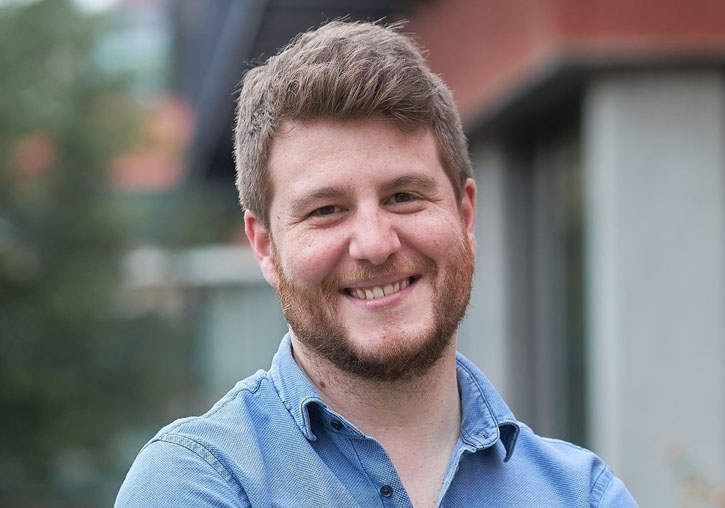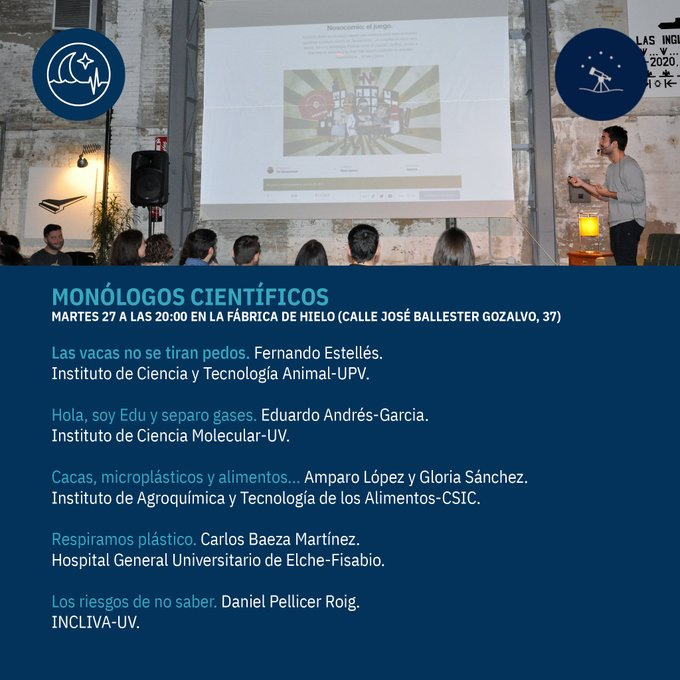
Scientists from five Valencian research institutions will star this Tuesday, September 27 at the Valencia Fábrica de Hielo, in a monologue session on science as a prelude to the main activity of the Mediterranean Researchers’ Night, which will be held on Friday, September 30 all over the world. The monologues will deal with topics such as microplastics in the human body, myths about the impact of cows on climate change, new ways of capturing C02, the need to invest in food science or the dangers of not knowing.
The event, starting at 8:00 p.m., will be led by Mila Martínez and Alexanda Muñoz, and has been organised by the University of Valencia (UV), the Polytechnic University of Valencia (UPV), the delegation of the Spanish National Research Council (CSIC) in the Valencian Community, the INCLIVA Health Research Institute and the Foundation for the Promotion of Health and Biomedical Research in the Valencian Community (Fisabio).
Specifically, the monologues will be “Cows don’t fart”, by Fernando Estellés, from the UPV’s Institute of Animal Science and Technology, who investigates the environmental impact of livestock farming and will explain some myths about it, especially in the case of ranching, an activity with an environmental impact, “but perhaps with less weight than we perceive because no, the cows are not destroying the Amazon, they do not pollute more than a car and no, they do not fart”.
For his part, Eduardo Andrés-García from the Institute of Molecular Science (ICMol) of the University of Valencia, in the Monologue “Hello, I’m Edu and I separate gases”, will show the research on new materials for capturing CO2 and other compounds, and will introduce the principles of mixing and adsorption.
“Poops, microplastics and food”, by Amparo López and Gloria Sánchez (Institute of Agrochemistry and Food Technology-CSIC) will address the importance of investing in science and, more specifically, in food science.
“We breathe plastic”, by Carlos Baeza Martínez (General University Hospital of Elche-Fisabio), will explain the results of his new research: the discovery of microplastics inside the human bronchi and the ways to reduce the risk that this implies, given that everyone is exposed to its inhalation and subsequently pathogenic germs can grow in the body.
Daniel Pellicer, INCLIVA and UV researcher, in the monologue “The risks of not knowing”, will deal with the tools and discoveries that help understand the world and the barbarities that have been said and done in the name of science or without taking it into consideration.
September 30 workshops at Príncipe Felipe Museum
The main activity of the Mediterranean Night of Researchers will be at the Príncipe Felipe Museum in Valencia, located in the City of Arts and Sciences (CAC), which will host 30 workshops on popularizing science. They are: “Chemistry in our lives”, “What do bacteria eat?”, “Bacteriopolis”, “Create your vaccine!”, “Make your slime and your kryptonite”, “Archaeo-science”, “Discover what is a biobank”, “Growing up healthy”, “The power of light” and “Discovering virtual reality”, among others. They will be in the morning shift for Primary and Secondary students (between 10 a.m. and 1 p.m. and prior registration) and in the afternoon they will be freely accessible to the general public, between 5 p.m. and 9 p.m.
After the workshops, at 1:00 p.m., there will be a round table with the researchers who direct European projects of the organising institutions in the Santiago Grisolía auditorium of the Museum and who can be asked about their research:
Iñaki Comas, researcher at the Valencia Institute of Biomedicine of the CSIC. ERC Consolidator Grant TB-RECONNECT on the study of tuberculosis.
Pilar Francino, Fisabio researcher, head of the genomics and health area. European project Stance4Health on smart technologies for personalised nutrition and empowered consumption.
Tania Fleitas, INCLIVA oncologist researcher. European project LEGACy on personalised medicine for patients with gastric cancer.
Marcos Latorre, researcher at the Polytechnic University of Valencia. ERC Starting Grant on the deployment of the G-CYBERHEART project (creation of bioartificial hearts for clinical transplantation).
Gustau Camps, researcher at the Image Processing Laboratory of the University of Valencia. ERC Consolidator Grant SEDAL on Statistical Learning from Earth Observation Data.
The Night is organised by the CSIC delegation in the Valencian Community, the University of Valencia, the Polytechnic University of Valencia, the INCLIVA Institute and Fisabio. These five institutions are part of the MedNight –in the case of CSIC, Fisabio and INCLIVA– and MedNight GTS –UV and UPV– European projects. Both universities in the city organise this event in coordination with Esciencia Scientific Events and the la Caixa Foundation, with a project as an act associated with the European Researchers’ Night (ERN) 2022. In addition, the Principe Felipe Museum, CaixaForum, the Oceanogràfic and the Príncipe Felipe Research Centre.
Images:
.jpg)











